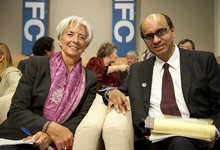
Typical street scene in Santa Ana, El Salvador. (Photo: iStock)
IMF Survey: IMF, With Firewall Pledged, Targets Growth and Jobs
April 21, 2012
- IMF members pledge over $430 billion to protective firewall
- Focus now on restoring "normal" level of growth within 2-3 years
- Reaffirm aim to complete quota, governance reforms by October
The International Monetary Fund (IMF), buoyed by pledges to contribute more than $430 billion to a reinforced anti-crisis firewall, set its sights on rekindling growth, restoring confidence, and creating jobs to put the global economy on a sustained recovery track.

IMFC’s Shanmugaratnam (r) with IMF’s Lagarde: emphasis must remain on fiscal, structural reforms to put economies on firmer footing (IMF photo)
IMFC MEETING
Singapore Finance Minister Tharman Shanmugaratnam, who chairs the policy-setting International Monetary and Financial Committee (IMFC), said ministers and central bank governors gathered in Washington focused on the “real sustainable solutions to this crisis that the firewall is meant to support.”
Calling the strengthening of the global safety net an “important step forward,” he told reporters that the main emphasis must remain on fiscal and structural reforms to put economies on a firmer footing. While getting budgets and debt under control was important, it was equally important to spur growth and get it back to normal levels within 2–3 years. Without growth, fiscal sustainability was not possible.
Collective approach
Christine Lagarde, Managing Director of the IMF, said the spirit and dynamic of the IMF-World Bank Spring Meetings amounted to the “Washington moment” that she had been seeking to drive forward a collective solution to the crisis.
The Group of Twenty (G-20), along with the IMFC, on March 20 announced collective pledges of more than $430 billion to the 188-member IMF—doubling its lending capacity—to help build confidence and prevent crises from spreading.
Although the global economy is slowly improving again, the IMF has said in its latest World Economic Outlook (WEO) report that growth this year is expected to be weak, especially in Europe, and unemployment in many advanced economies will stay high.
Although action by policymakers in Europe and elsewhere has helped to reduce vulnerabilities, risks of a renewed upsurge of the crisis in Europe continue to loom large, along with geopolitical uncertainties affecting the oil market.
Since the start of the global economic crisis in 2007, the IMF has committed more than $300 billion in loans to its member countries. In response to the crisis, the IMF also reformed its policies toward low-income countries and quadrupled its concessional lending.
Strong resolve
Tharman said he saw a courageous and strong resolve to tackle the difficult issues of competiveness, debt, and thrift and build a better future. “We know it’s going to be a long road and a multiyear journey; there will be pitfalls along the way which is why Christine’s umbrella is extremely important,” he said referring to the additional pledges to the IMF.
“It’s a very challenging journey, with politics intersecting with economics.”
Governance changes
In a communiqué, the IMFC reaffirmed “the urgency of making the 2010 quota and governance reforms effective by the 2012 Annual Meetings to enhance the Fund’s legitimacy and credibility.”
The 24-member IMFC urged member countries to ratify the reforms designed to give a larger say to dynamic emerging markets and preserve the voice of poorer countries.
The communiqué emphasized that global collaboration was the key to ensuring stability and rebuilding growth around the world.
The IMFC called on members to complete a financing package for low-income countries.
The Group of 24, which represents developing countries, said in a separate communiqué that they would focus on job creation and social safety nets that protect the poor and vulnerable. They said they were worried by a drop in official development assistance to poorer countries.
At the joint World Bank–IMF Development Committee, delegates said April 21 that growth in emerging and developing economies continued to be relatively strong but poor countries still need support. “Implementing policies and structural reforms to promote poverty reduction and inclusive growth must continue,” the committee said.
Outgoing World Bank President Robert Zoellick stressed the need for boosting employment and protection for the poor. But he said the “best safety net is a job.” Ministers and central bank governors congratulated Jim Yong Kim on his selection as the next World Bank president.


